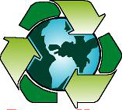- Decide what to recycle—Evaluate how much space you have to sort and store materials and what items you tend to go through. Paper products are a safe bet to be recycled, and aluminum or steel cans are valuable. Other commonly accepted items include glass and plastic bottles.
- Find a vendor—Check with your local recycling center, municipality and waste hauler to find out what kind of materials are accepted in your area.
- Decide on storage—Washable plastic bins or trash cans are the best and cardboard boxes are good too. Be sure to rinse out the containers that held food to avoid critters.
- Educate participants—If items are put in the wrong containers, it means more work for you and could mean materials might not be recycled. Let the people know what to do.
- Label bins—Print up a sheet of special instructions, such as: remove caps, stomp on containers, break down cardboard boxes, bundle newspapers, etc.
- Maintain and monitor—Keep the storage bins clean and dry and make sure materials don’t pile up. A clean recycling area encourages other to keep it clean and uncluttered. Watch for critters from unwashed containers.
- Reward good behavior—Praise your participants and share any monetary rewards from dropping off materials.
Tuesday, April 22, 2008
EARTH DAY
There are a few key elements to starting any recycling program for a business, a school, an organization or just in your home.
Posted by ezhan_artwork at 9:27 AM
Subscribe to:
Post Comments (Atom)























tahniah abg izhan ......nice blog when we will go to bowl
ReplyDelete